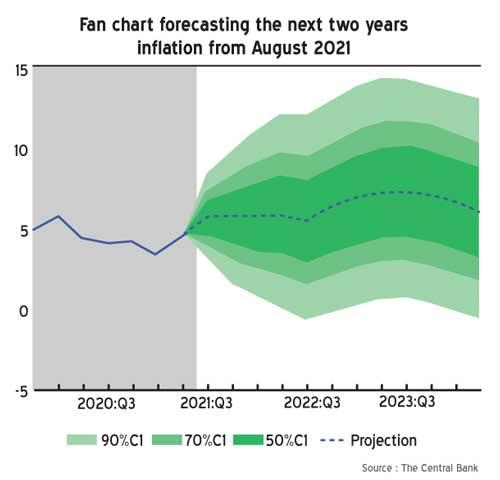28 Jun 2022 - {{hitsCtrl.values.hits}}
As the former Central Bank Governor Ajith Nivard Cabraal implicated his subordinates for supporting the decision to float the rupee on March 7, which pushed the country into hyperinflation and thereby many millions into hunger, the questions are being raised whether the main institute tasked with maintaining price stability in the economy had actually lived up to its key mandate.

Maintaining price stability is the primary mandate of any central bank in the world and their credibility has come under serious question in recent times for inaccurately projecting the inflation globally since last year and acting late. However, Sri Lanka’s case is an outlier, as the country was pushed into hyperinflation after the Central Bank’s decision to float the currency on March 7. Cabraal last week claimed the decision to float the rupee was based on a board paper submitted on March 7 by all the three deputy governors and directors of the Economic Research Department and International Operations Department.
Hence, the questions are raised if these officials failed in their duty to provide inflation forecasts at different levels of exchange rates between the dollar and rupee as part of their board paper to the Monetary Board to take an informed decision as to what extent the rupee must be devalued.
Further, the questions are asked if the inflation forecasts provided by the Economic Research Department were not accurate and therefore, they misled the Monetary Board.
At the same time, it is not clear whether the Monetary Board went ahead with its decision to float the currency disregarding the inflation forecasts made by the Economic Research Department. During a Committee on Public Enterprises (COPE) hearing recently, two members of the Monetary Board dissociated themselves from the decision to devalue the currency beyond Rs.230 to a dollar but COPE member and opposition legislator Dr. Harsha De Silva said the members cannot abdicate from their collective responsibility.
Sri Lanka’s monetary policy setting process lacks transparency, as the Central Bank does not publish the monetary policy meeting minutes and none of its members, except for the Central Bank governor, who acts as chairman of the Monetary Board, speaks to the media.
Since the decision to float the currency, Sri Lanka’s headline inflation measured by the National Consumer Inflation hit 45.3 percent in May over the same month last year while the Colombo inflation surged by 39.1 percent, with some private inflation gauges putting the increase in prices as high as 128 percent. When the Central Bank delivered its first rate hike in August 2021, the Economic Research Department didn’t forecast the headline inflation above an upper range of 10 to 15 percent in 2022 and 2023, while maintaining the baseline inflation at their desired range of between 4 to 6 percent. In a fan chart presented on inflation forecast in the next two years from August 2021, the Economic Research Department attached a 50 percent confidence level for the headline inflation level to stay between 5 and 10 percent in the second quarter of 2022.
08 Nov 2024 43 minute ago
08 Nov 2024 2 hours ago
08 Nov 2024 3 hours ago
08 Nov 2024 4 hours ago
08 Nov 2024 5 hours ago